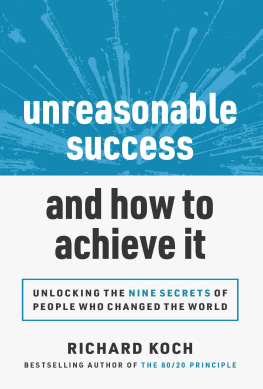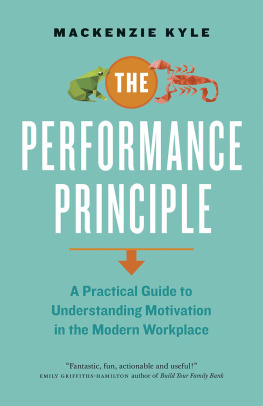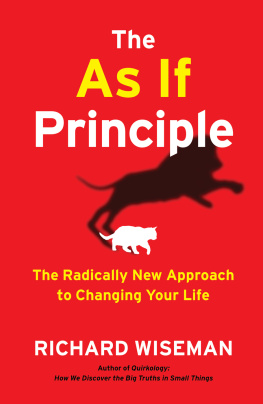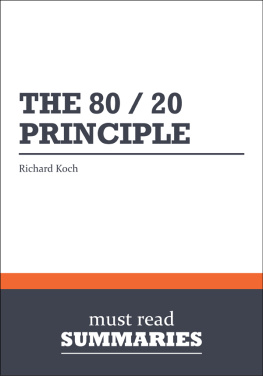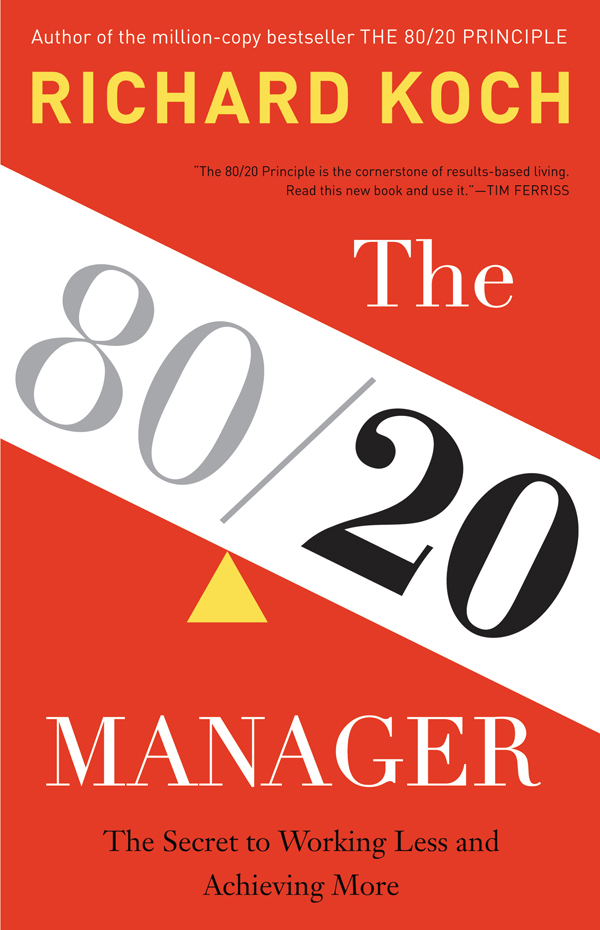
In accordance with the U.S. Copyright Act of 1976, the scanning, uploading, and electronic sharing of any part of this book without the permission of the publisher is unlawful piracy and theft of the authors intellectual property. If you would like to use material from the book (other than for review purposes), prior written permission must be obtained by contacting the publisher at permissions@hbgusa.com. Thank you for your support of the authors rights.
Thank you for buying this ebook, published by Hachette Digital.
To receive special offers, bonus content, and news about our latest ebooks and apps, sign up for our newsletters.
Sign Up
Or visit us at hachettebookgroup.com/newsletters
For more about this book and author, visit Bookish.com.
Copyright 2013 by Richard Koch
Cover design by Thomas Beck Stvan
Cover copyright 2013 Hachette Book Group, Inc.
All rights reserved. In accordance with the U.S. Copyright Act of 1976, the scanning, uploading, and electronic sharing of any part of this book without the permission of the publisher is unlawful piracy and theft of the authors intellectual property. If you would like to use material from the book (other than for review purposes), prior written permission must be obtained by contacting the publisher at permissions@hbgusa.com.
Thank you for your support of the authors rights.
Little, Brown and Company
Hachette Book Group
237 Park Avenue, New York, NY 10017
littlebrown.com
twitter.com/littlebrown
facebook.com/littlebrownandcompany
First ebook edition: October 2013
The publisher is not responsible for websites (or their content) that are not owned by the publisher.
The Hachette Speakers Bureau provides a wide range of authors for speaking events. To find out more, go to hachettespeakersbureau.com or call (866) 376-6591.
ISBN 978-0-316-24305-6
For Nicholas Walt, with belated thanks
As to methods there may be a million and then some, but principles are few.
The man who grasps principles can successfully select his own methods.
The man who tries methods, ignoring principles, is sure to have trouble.
Ralph Waldo Emerson
A little over a year ago I was reading The 80/20 Principle for about the tenth time. I happened to be working with managers from several of the worlds largest companies and was stunned by how little they applied the principle to the way they managed. In conversations it became clear that they knew the 80/20 Principle, but the way they managed demonstrated that they werent deploying its practical power in their daily work.
So I wrote to Richard and suggested he write the book you are holding in your hands now.
Why did I do that?
Because I want to see more 80/20 managers in the world. Lots more.
What does that mean?
I want more executives who achieve great results, transform their companies, and help the people they lead to do their best work; and at the same time to feel more fully alive, satisfied and happy themselves. Most of all, I want to see the very character of the way we do business transformed, so everyone realizes that extraordinary results are possible with ordinary effortif we really care about achieving those results.
The virtue of this book is that it is immensely practical. You will start applying the lessons as soon as you read them. Are you ready to take your life and your business to the next level?
The genius of the 80/20 Principle is that it is counter-intuitive. The genius of Richard Koch is that he makes the counter-intuitive accessible.
At the same time it is essential to understand that while Richard makes high achievement as easy as it can be, its not true that you can attain great goals without some unusual effort. The point is that this unusual effort doesnt have to be a grind. It doesnt have to be soul-destroying. It doesnt have to compromise your values. It doesnt have to risk overwhelming you or your loved ones. In fact, all of these things would be clear signals that you were on the wrong path.
The unusual effort that this book so brilliantly encourages is in the mind. Are you willing to think in a new way, on a new level? If so, prepare yourself to sit at the feet of one of the masters. He is about to teach you how to use the most productive levers at your disposal, including many you thought were out of your reach.
If you put into practice what you learn within these pages, you will find that it is the most enjoyable effort you have ever exerted, not only for you but for everyone around you. When correctly embraced, the 80/20 Principle is life-enhancing for everyone.
I have enjoyed watching this book evolve, and it has been a privilege to watch Richard work, see his ideas develop, and observe his passion for helping you, the reader. This is a book that will help you become the best version of yourself; and it will lead you to help everyone else live their best life, too.
Read this book and you will enjoy it. Live this book and you will find it is a game-changer.
Everybody wants to work for an 80/20 manager.
Isnt it time you became one?
Matthew Kelly
Singer Island, Florida
When work is a pleasure, life is a joy!
When work is a duty, life is slavery.
The Lower Depths, Maxim Gorky
Would you like to simplify your work and life? Is the sheer volume of work you face so daunting that you often fall behind? Does it seem that work controls you, rather than the other way round?
If so, youre not alone. A large number of managersespecially in these difficult timesfeel like that.
But there is a solution. And that solution will not only improve your performance exponentially but will enable you to do so by working less hard.
Yes, really.
The answer is to become a much more effective manager, and this book will show you how. It will also show how to enjoy your work and build a fulfilling career without stress or long hours. And how to achieve far more than you do at the moment without denying who you are, or short-changing your family and friends.
How is all of this possible?
Most companies, and certainly most managers, focus on inputs rather than outputs. They look at processthe 1001 tasks you have to do each week. Whereas they should be looking at resultsspecifically at what produces the best results. Yet, as this book will show, when you really scrutinize what produces great results, the answer is surprising.
As you will discover, most great results are achieved through relatively little action and energy. But the small inputs that produce big results are generally hidden by a mass of inputs that produce a few good results, and often many bad ones. Companies and managers tend to look at averages, not outliers and extremes. Yet, surprisingly, these are what really matter.
We know this because of a strange economic principle first outlined over a hundred years ago by the Italian economist Vilfredo Pareto. Since then, it has been validated by numerous other economists and business strategists. The Pareto Ruleor, as I call it, the 80/20 Principle (or simply the Principle)is the observation that if you divide the world into causes and results, relatively few causes (roughly 20 percent) nearly always lead to most of the results (roughly 80 percent). Thus, a small number of people are responsible for most human progress (and indeed most human disasters). A few motorists cause the majority of accidents. A few managers determine the success or failure of their company. Time and again it has been shown that a few products, customers and decisions account for most of a firms profits. By concentrating on the vital few customers and productsby selling more of the highly profitable products to the ultra-profitable customersit is often possible to multiply profits many times.
Next page

